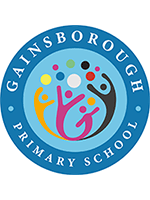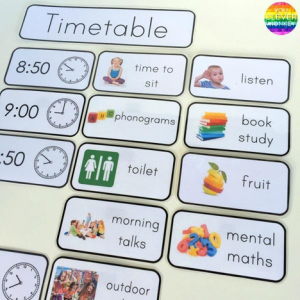
Children may be experiencing a wide range of emotions during this transition, from fear and anxiety to excitement and enthusiasm. Even positive emotions can be unsettling to children.
The following suggestions are designed to make the transition as smooth as possible for everyone.
Helpful resources:
From the Anna Freud Centre:
Supporting schools & colleges: A guide to supporting the mental health and wellbeing of pupils and students during periods of disruption
Videos for school staff, one for parents and one for children and young people
From the Autism Education Trust:
https://councilfordisabledchildren.org.uk/help-resources/resources/transition- toolkit
Coronavirus Social Stories: https://theautismeducator.ie/2020/03/11/corona-virus-social-story/
https://www.sccoe.org/news/featured/Documents/Coronavirus%20Social%20 Story%20-%20Cheri%20Palladino.pdf
https://paautism.org/resource/coronavirus-social-story/
Routines, routines, routines
One of the best ways to make the transition to learning at home is to establish routines as soon as possible. Ideas:
- Copy the school timetable so your child is familiar with the structure of the learning day
- Include similar break times and meal-times (if possible and/or appropriate)
- Work with your child (see below) to replicate school. This can be made fun and playful, such as using a bell or timer to signify lesson end or time for a break. You might invent a variety of ways to ‘schoolify’ your home and your child might enjoy coming up with
- Work with your child to create a ‘school space’. If space is limited, identify a ‘school’ chair or ‘school space’ to replicate the physical environment where learning takes
- You may need to practice new routines (see visual timetables below)
- Find ways for you and your child to use technology to meet up with others.
This is a useful video about designing a work space for children who are easily distracted:
http://www.youtube.com/watch?v=-bsGrd1RCys
- Think about:
Sensory processing – what can we remove/what can we add? Visual Time-tables
Structured ways to de-stress Quiet spaces to learn
Ways to maintain exercise
Visual timetables
Many children don’t take information in well when they listen. This includes instructions, information and explanations. Many schools use visual timetables which help children build routines. These are helpful for anxious children, those with low motivation, those with Autism, sensory processing difficulties, speech communication and language difficulties and those with sequencing difficulties.
The visual timetable should be used to show your routine clearly. You can identify what the current activity is, and what the next one will be. If possible, involve your child in making the visual timetable, either by:
- drawing
- selecting picture from online
- taking or selecting
The visual timetables can be stored on the computer and shown when needed.
Resource:
https://www.twinkl.co.uk/resources/class-management/daily-routine/visual- timetable
Now and Next Cards:
Some children who struggle to concentrate or remain motivated may benefit from ‘Now and Next’ Cards. This is a particularly good way of introducing
rewards for task completion. (If your child struggles with this, make the ‘target task’ very short, followed swiftly by the reward activity. The reward activity
might be a ‘special interest’ such as playing with trains or lego. Gradually, the child will trust the reward process and you can extend the target task
gradually’.)
Resource:
https://www.twinkl.co.uk/resource/t-c-255219-now-and-next-board-and- cards-resource-pack
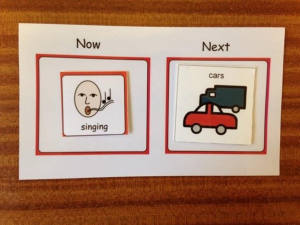
Collaborate when planning
One of the most powerful resources at your fingertips is your child/children. Ask them how the family can make things work. Questions might include:
- What is the best way for me to help you?
- How can we make a space for you to learn best?
- How are we doing?
- What can we improve?
Children are great problem solvers. Involving them in the required steps such as designing the workspace and creating the visual resources can help then feel secure involved and motivated.
This can work in ‘micro steps’ for children who are hard to motivate. Working together on preparing the materials needed for a lesson and getting the space set up can help. In school, children are learning in groups, so doing computer- based work yourself alongside them can show solidarity.
Education
Here are some ideas to help children bridge the gap between being at home and getting ready to learn. They are designed for you and your child or for two or more children to work together to start thinking about their learning. It can be very hard to start work from a standing start, so these will help children to think and talk about a topic area, so they are ‘warmed up’ for the following activities.
Quick tip:
If your child is stuck, ask them what they are thinking:
- Where did you get stuck?
- What did you start to do?
- Tell me how you are thinking about this
This works well before ‘diving in’ and trying to instruct them. It helps to encourage independent thinking and problem solving.
Odd-one out:
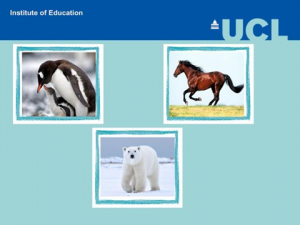
Ask children which is the odd-one-out. Encourage lots of different answers. Encourage a discussion about the themes that emerge. Use a range of pictures that help children to think and talk about different topic areas.
Use visual frameworks to deepen concepts:

Ask children to identify the similarities and differences in a range of topics:
- Between Romans and modern life
- Between cars and horses (to explore life processes)
- Between characters in a novel Venn diagrams can also be used to sort:
- Warm blooded/mammals
- Factors of 2 and factors of 5
- Viking objects/modern objects Using Bloom’s Taxonomy:
This verb wheel is full of great ideas for activities. The verbs in orange pose exciting ways of asking children to think about their activities. The suggestions in green suggest the product or activity that children could produce. These ideas work well for children of different ages working together.
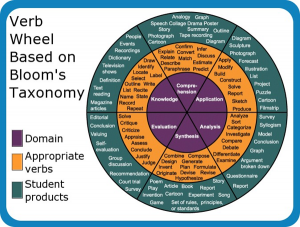
Encouraging discussion: useful resources
Philosophy for Children https://p4c.com/
Let’s Think
Community
Finally, ensure regular contact online with friends and family for you and your children. Community is vital to support all of us through this challenging time.
Other useful links
The Communication Trust
https://www.thecommunicationtrust.org.uk/resources/resources/resources- for-parents/
Home schooling advice from the DfE https://www.gov.uk/home-education
Contact (national charity for families of children with disabilities) https://www.contact.org.uk/
